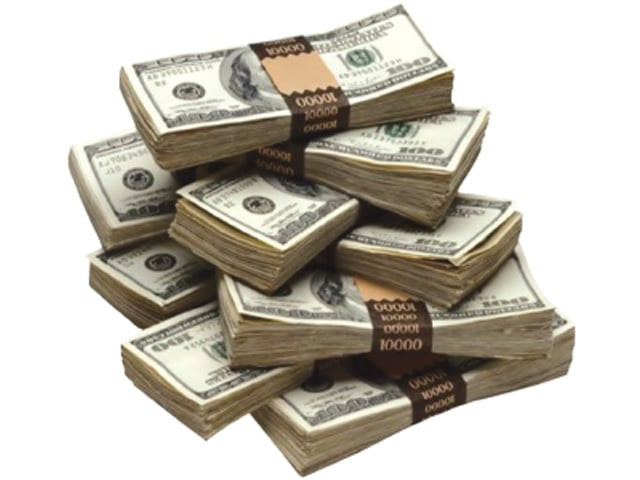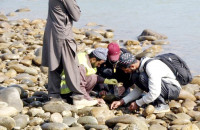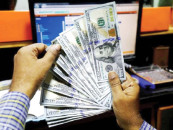$8b buying makes rupee weak: SBP
Central bank says strong rupee could hurt external sector; inflation may rise

The central bank admitted on Tuesday that its nearly $8 billion purchases of US dollars were keeping the local currency weak but added that a stronger rupee would make imports cheaper and could in turn put pressure on the external sector.
Acting Deputy Governor of the State Bank of Pakistan (SBP), Dr Inayat Hussain, told the National Assembly Standing Committee on Finance that the current US dollar-rupee parity of around Rs282 was "fair."
"Your assertion is correct. If the SBP stops mopping up dollars from the market, it will strengthen the rupee. But imports will increase too," he said, responding to a question by MNA Muhammad Jawed Hanif.
The committee, chaired by PPP's Syed Naveed Qamar, received a briefing from the central bank on inflation trends, economic growth, current account deficit, and exchange rate parity.
During July-May of FY2024-25, the SBP had bought a total of $7.8 billion from the local market, said Hussain.
Critics have long accused the central bank and the International Monetary Fund (IMF) of manipulating the rupee's value by buying dollars from the local market in breach of the free-market principle the IMF itself dictates to the world.
Last week, Deputy Prime Minister Ishaq Dar reiterated once again that based on economic fundamentals, the rupee should trade at Rs260. But SBP's dollar purchases have kept it closer to Rs282 per dollar.
Hussain argued that the dollar purchases have also improved the quality of foreign exchange reserves, which were earlier built mainly through foreign loans. Now these reserves are mostly built on purchases from the local market. "Our primary objective is to build reserves. We purchase only when there is surplus foreign currency available in the market," he said.
MNA Hanif said that market talk places the rupee's fair value between Rs250 and Rs260. By keeping it at Rs282, he said, the SBP was contributing to inflation.
"As of now, the rupee is fairly priced. It is neither undervalued nor overvalued," said Hussain, adding that future rates would depend largely on foreign exchange availability and import volumes.
SBP Executive Director Amin Lodhi said the central bank's target was to increase reserves to $15.5 billion by December and $17.5 billion by June next year. But this would still be below the safer level of $20 billion, equal to three months of import cover, added.
Hussain stressed the need for a stronger cushion in order to absorb any shocks from a reduction in exports given the current challenging environment.
He added that the current account deficit is expected to remain under control and is projected to be in the range of up to 1% of the size of the economy. Foreign remittances remain the mainstay for lower deficit, with the central bank expecting remittance inflows to touch $40 billion this year.
Inflation outlook
On inflation, Lodhi warned that it may rise gradually and could also temporarily breach the 7% target due to the erosion of base effects and the impact of recent floods. He said that projections show that inflation would later return to the 5-7% range and is expected to stay stable.
He said that the impact of gas price hikes in July and another expected surge in February had already been factored into forecasts by the central bank.
Economic growth, however, may remain limited to around 3.25%, below the government's 4.2% target. Average growth over the past decade has been only 3.4%, reflecting repeated boom-and-bust cycles, said Lodhi.
He said meeting the 7% inflation target would be contingent upon keeping interest rates at the current 11%. If the interest rates are reduced, the inflation would go up, he said.
The committee chairman said the SBP was often criticised as "too conservative," but argued that the economy needed an impetus to grow.
Tax controversy
The meeting also turned to tax matters. Federal Board of Revenue (FBR) Chairman Rashid Langrial revealed that Prime Minister Shehbaz Sharif has constituted a committee to review the newly imposed 10% sales tax in the merged districts of Khyber-Pakhtunkhwa.
After facing considerable pressure, the government imposed the sales tax in the budget, but its decision to reopen the matter may raise many eyebrows, particularly at the IMF.
Langrial said the committee would be headed by the PM's Adviser on Political Affairs, Rana Sanaullah Khan.
The newly merged districts were exempted from sales tax, creating immense problems for other areas of the country due to the 18% cost advantage enjoyed by industries located there. The facility was grossly misused, forcing the government to withdraw the exemption and impose a 10% tax in the current fiscal year.
Qamar said the Public Accounts Committee had referred the issue to the Finance Standing Committee after receiving representations from various trade bodies.
The FBR chairman proposed tax differential subsidies for residents of these districts through the Benazir Income Support Programme (BISP) to offset the impact, but the committee rejected the recommendation.























COMMENTS (1)
Comments are moderated and generally will be posted if they are on-topic and not abusive.
For more information, please see our Comments FAQ